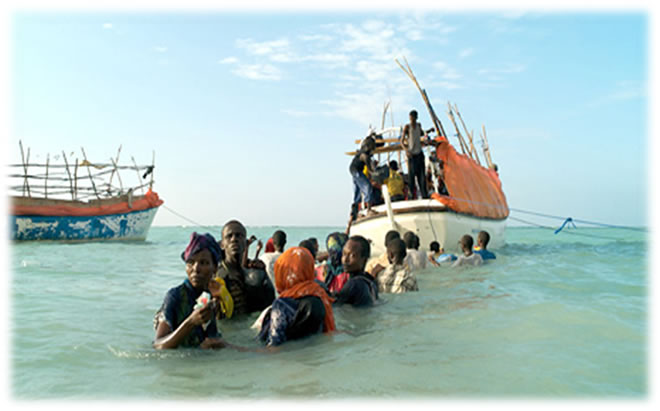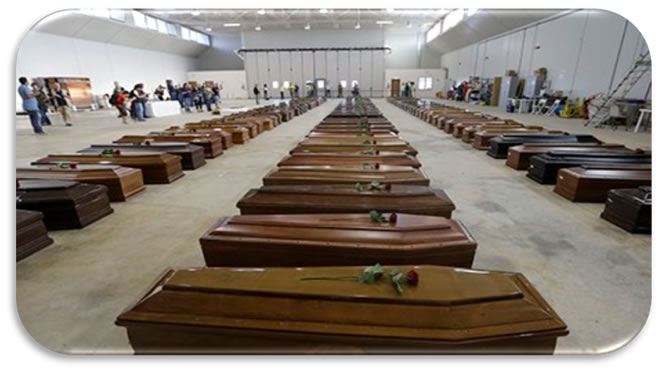Debacle at Sea

by Heikal Kenneded
As
clichés go, Somalia has been without a functioning government since 1991 and
one of the most dismal collateral damages resulting from the civil war is its
desperate youth taking to the dangerous seas in their odyssey to find a
safe-haven in Europe and beyond. From the early 1990s to present day, thousands
of Somali young men and women have lost their lives in their attempt to flee
the civil war, when the boats carrying became capsized en route to European
shores. The incessant anguish of Somali asylum seekers is the heart of the
problem for a nation in turmoil besieged by war, famine and terrorism.
Desperate to escape from the grim reality in the country and hope for a better
future, the Somali young people daringly jump into the “Seas of the Dead.”
These tragedies have gone too long and too many live have been lost in vain
that the Somali government has to step up its efforts to curb youth
unemployment, while the world at large must use this impetus to stabilize
Somalia and rein in terrorism and piracy crises in the Horn of Africa.
At
the onset of the Somali civil war, I was among the first wave of refugees who
braved the dangerous seas on a rickety boat with no engine and crossed the
Somali border into Kenya in order to escape the fighting. After two decades of
my desperate adventure, it breaks my heart to see most of Somalia’s youth are
subjected to such cruel destinies while the rest of the world watches with
utter disregard of these tragedies. For most Somali asylum seekers who
take to the high seas are fully aware of the serious risks they face in the
seas by boarding overloaded vessels and sailing on pending bad weather because
they have relinquish all hope of finding peace and prosperity to prevail in
their own country.
According
to the United Nations' refugee agency, UNHCR, Somalia is “the third biggest
country” whose refugees arrive on European shores. These last two weeks’
tragedy where two such vessels carrying more than two hundred asylum seekers
have lost their lives in their attempt to reach European shores should be a
wakeup call to the Somali government and the rest of the world about the crisis
in which these youths are escaping from to take such fatal risks on their
lives. Though, this is hardly surprising, after the country went through two
grueling decades of civil war and the chaos that comes with it, which has
devastated the lives of an entire generation with neither proper education nor
gainful employment to improve their chances to succeed. The only option
available to many of these young people has been to take their chances on
finding hope in overseas, despite the serious risks involved.
It’s
also clear that the newly elected Somali government is not taking these
tragedies seriously as political stability problem, as well as simply security
issue. President Hassan Sheikh has now been Somalia’s president for more than a
year, yet he has not seized the opportunity to deal with the root causes of the
country’s security problems. The most fundamental is that unless Somalia must
gainfully occupies its youth by either improving the education system or
creating enough employment, peace will always be an elusive past. Given
Somalia’s security tribulations, some emphasis on job creation is inevitable
because the two issues are inexorably interlinked. Despite all the talk of the
new Somali government for turning a corner to improve the country’s security,
economic opportunities are still rare and the youth have no choice but to
venture out of the country and risk their lives to find better
opportunities in overseas. The President’s resolve of tackling the country’s
grotesque unemployment problem should be decisive, vigorous and most
importantly pragmatic. In other words, mounting an effective challenge to
Al-Shabab’s recruitment efforts lies in creating opportunities for the youth in
the country.
The
European Union spends millions of money on border enforcements and deporting
immigrants that eventually do not really discourage most of these asylum
seekers many of whom brave the seas time and again. In other words, border
enforcement and compulsory deportation do not unfortunately address the core
problems that drive these youths to risk their lives in the extreme high seas.
However, the European Union in conjunction with the Somali government could
prevent these recurrent tragedies in their seas, and divert the flow of asylum
seekers permanently, by simply addressing the “push” factors that impel African
asylum seekers, including Somalis to risk their lives in the first place — and
by helping their families avoid the heartache associated with such exodus in
the perilous seas.

Figure 1. Coffins of some of the Somali victims of the October disaster in a hangar at Lampedusa airport. (Photograph: Luca Bruno/AP)
For
too long, the European Union’s immigration policy has turned a blind eye on the
innumerable African immigrants dying on its seas and shores. But now that the
predicament of these immigrants has worsened since the Arab Spring because
travelling to Europe across the Mediterranean ocean has never been easier,
which saw for the last two years, tens of thousands of people travelling from
North Africa to reach either Malta or Italy. Unfortunately, these two European
countries have some of the worst immigration laws in Europe and treat with all
disregards the rights and dignity of African asylum seekers by either throwing
them in jail as though they’re criminals or deporting them back to their
country of origin, upon arrival. Thus, the International community must demand
a different approach from the European countries, one in line with the
international migration and human rights.
For
the European Union to abate these tragedies at their shores, they could
increase aid to Somalia to improve education and create new skills for the
youth, which would lower such perilous adventures, in the first place. The EU
could finance or promote microloans to help youth start job-generating
businesses. For example, the EU could gear its ineffective anti-piracy efforts
to investing the lives of these young men and women who are risking their lives
due to the lack of opportunities in their country. In addition, it could work
with local non-profit organizations in Somalia who endeavor toward investing in
job-creating enterprises.
Finally,
the world, including Somalia, has a duty to save the Somali youth from risking
their precious lives in the seas in order for them to achieve their dreams.
Provided the Somali government is transparent and accountable enough to its
people, the International community should help with economic development and
job creation.
Heikal
Kenneded
Washington
D.C.

Comments
Post a Comment